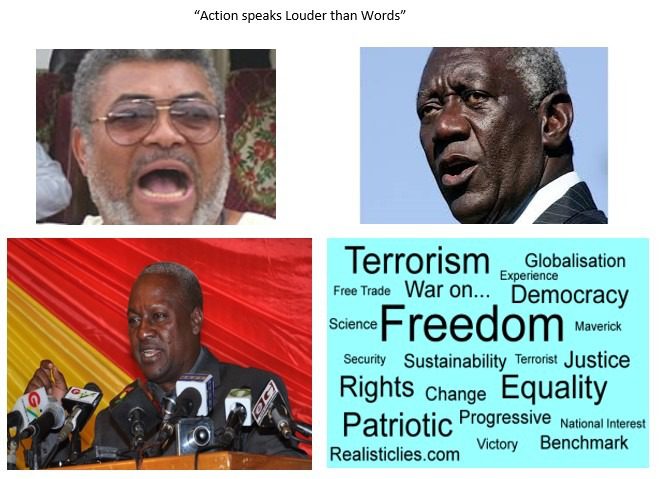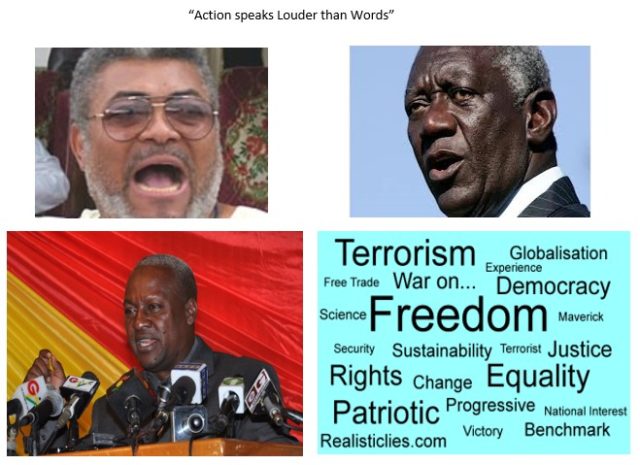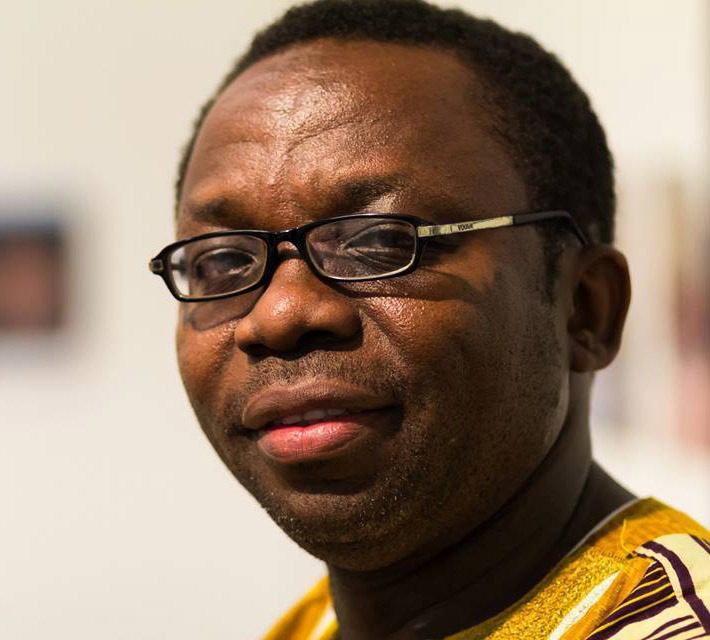Global Issues
My Worst Fear is Leadership of ‘Words’

We are glad the National Economic Forum (NEF) in Ghana has come to a successful end. I’ve no doubt in my mind that; there’s an earnest power in consensus building, especially through the gathering of ‘best of the best’ in an expressive society such as ours. When I first heard about this forum, I was very delighted thinking that we’ve finally hit the target. However, my inner predispositions were a little bit shaky about the recurrence of this forum. So, I rhetorically said: “hei, wait a minute! Is this the first time Ghana is organizing such a forum?” A pause for just a second, with a sober reflection, was the beginning of my worst fears! Did Ghana really need another national forum to fix the economy? What happened?
MY PREVALENT FEARS!
Well, if my memory is right, this is the third time Ghanaian leadership is using this kind of profligate process to seek ideas from the experts. In addition to the one organized during J.J Rawlings’ era, similar phony opportunities were also created during J.A Kuffour’s leadership. And now, President John Mahama has also repeated history, but I’m pretty sure; he knows very well that ‘eyes are watching’ this time. My first question is: When will Ghanaian leaders ever sit down, think a second, and merge critical thinking with problem solving? It may be too late now to comment or make any suggestion to this almighty 22-point ‘communique’ dubbed: ‘Senchi Consensus’ at the just ended NEF. However, it’s important we set the records straight and figure out the way forward.
Fear # 1: Ghanaians are noted for caring more about Shakespeare, or Chaucer’s English grammar, or in an extreme cases; Homer’s epic poem – Iliad or odyssey- a very demanding poems to comprehend, more than the ideas that one has to offer. I remember during our high school days in Ghana, we used to call it “boom”. All that people care is to critically assess your grammar more than whatever you are talking about. That’s why I’m afraid this NEF is gonna be another display of big grammar sitting in the archives like the previous ones for the leaders to refer and quote them as their line of action whenever they’re questioned. Who cares about English grammar these days? I don’t! Technology, engineering and advancement in science rules the 21st century technology world. We’re not in the 18th or 19th century where people swanked themselves with philosophy, literature, classical history and law.
Africa can no longer continue to behave as if we are in the 18th century where by ones’ popularity depended purely on the number of philosophical writings and the quality of your grammatical display. I’m not surprised why corporate America does not tolerate the attitude of ‘talking, and talking, writing, and writing gibberish philosophical sayings. “Action” is the favorite word everywhere these days! Unfortunately, in Africa we still cherish and adore talking and writing garbage, with NO action on drafted policies. We must keep up with time because, action speaks louder than words in this millennium, and the time is now. What can African leadership offer and when can they deliver their numerous promises on paper for the benefit of the citizens?
Let’s take a look at the former OAU or now AU’s constitution/objectives on the provision of security for their citizens, and the excellent display of the Queen’s Language. You will immediately think that it’s the best continental union on earth. But what do we see? Until the sad abduction of the nearly 300 Nigerian schools girls, one would have thought that those ‘long grammatical phrases’ siting in their archives do have a meaning. Remember, all the previous reports have been archived already and I bet you; you might have to pay bribe or induce someone at those sluggish sector ministries in order to grab a copy. That’s why I’m afraid, it might just be another display of “big grammar’ that some of us may never ever understand what it means, let alone to dream about its implementation. By the way, has anybody seen Nigeria’s national security strategy document? I don’t wanna go there because, this article might end up being a book. However, just ask yourself: What is the meaning of those security strategies now that it’s perfect time for action after the abduction of these innocent girls? Where is the action? Can we really deliver what we write? You are the judge!
Fear # 2: Point 2 of the “Senchi Consensus” 2014, National Economic Forum clearly states:
“That long term national interest should supersede all other interests”.
Wow! Are we sure about that statement and how do we get there? Just like the previous reports, I’m very afraid that this 22-point communique also deals heavily with just a short term fiscal and monetary remedies particularly, about the unprecedented free fall of the Ghanaian cedi. I know the fact that an average African leader has no idea about long term strategy and what that means when it comes to economic development. After all, who cares? Most of them don’t! They only care for their immediate satisfaction as if there will never be tomorrow. This has been our thinking and pattern since independence, and that’s it, nothing else. Based on my own analyses, I’m confident that the main focus of the just ended NEF in Akosombo-Ghana is to return the total operating balance before gains and losses to a surplus, probably not later than the last quarter of 2015. The Government is also focused on returning to cash surpluses so it can begin to pay off foreign debt and the messy arrears of salaries in Ghana these days.
Folks, let’s not forget that with the recent low growth in the advanced economies, developing countries have a strong incentive and every opportunity to seek out new domestic engines for efficiency and productivity growth, as well as greater equity in development. This means the potential of fiscal policy to promote these objectives MUST be of great interest to developing country policymakers. There is no way we can move forward without the building of institutions that function without the dictates of government leaders.
If this just ended NEF or ‘Senchi Consensus’ did not take into consideration a transparent framework within a reasonable time frame, comprising laws and regulations which are enforceable through an independent judiciary, impartial and incorruptible police force, then, I can guarantee you the work done during this three-day forum will be zero! In other words, I’m expecting to see in the report a decisive policy whereby all decision makers should be accountable to the Ghanaian society in general and particularly to those affected by the decisions made or actions taken on its behalf. But I know, that’s one of my fears that may NEVER diminish.
Fear # 3: History has it that Africans do not appreciate the complexities involved in decision-making and problem solving. We just can’t merge the two and that has been one of our biggest challenge in our struggle for poverty reduction and development. Once again, the ‘Senchi Consensus’ is more likely to remain grossly dead document, and may never ever be revived or discussed after two years. And I would be very contented to challenge anyone who doubts conclusion.
Please, don’t get me wrong because, sub-Saharan Africans especially Ghanaians can write exceptionally well, pretty much about anything including ‘neuroscience and rocket science’. The questions is: Can we put our words into accomplishment? I do not think that is a possibility in Ghanaian context in this very generation. I’m not surprised that some of my colleagues from the western world think that Africans are mere dreamers! Do we have what it takes to disprove this erroneous assertions about Africans? Well, may be yes! But only in the next generation.
My Nightmares!
Honestly, about 80% of all development strategies in Ghana since independence have failed. These failures are mainly due to ineffective planning methods for turning strategies into executable projects. Most African leaders do not have the capabilities that offer a breakthrough planning approach that clearly align projects with strategic intent to boost their odds of project success.
Just look at the various past and present governments in Ghana for instance, you will realized that they can’t figure out how to learn a ‘common language’ and a step-by-step process for designing successful projects, programs, and change initiatives. In most cases, they lack the logical framework, as well as the interactive planning matrix that brings exceptional clarity for any projects they embark on. This explains why there are various disgusting open drainage systems clogged with stinky debris as well as fragmentary projects such as roads, Science labs, hospitals, housing project, school buildings, various local government projects, etc. etc. everywhere.
You will all agree with me that solving a problem is to identify it as specifically as possible. In other words, problem solving involves evaluating the present state of the problem and determining how it differs from the genuine goal. I’m aware that identifying and collecting practicable steps in a project plan can be daunting to some of us at first. It takes some experience in both being involved in the execution of projects as well having some experience in planning in order to get good at it. At the same time, I believe 57 years of hands on experience is more than enough time to master the basis for a project specialization, as Economists usually say. Unfortunately, African leaders have excuses, upon excuses, justifications upon justifications for almost everything! Why?
My worry is that, it does not mean or justify these irresponsible leaders to continually neglect their basic responsibilities. That’s why it’s necessary to develop a work breakdown structure which is also the backbone for the project that identifies all the tasks. If our leaders think, reason and assess each task based on cost, risk, duration, quality, resource needs, procurement requirements, before they think about their share in a particular project, then I can confidently guarantee you that they will be able to roll up all abandoned projects into a comprehensive project plan.
Folks, the take home here is this: the ‘Senchi Consensus’ is well written in words with emphasis on the short term fiscal and monetary remedies. However, in addition to keeping an eye on the immediate issues, it’s also important for Ghanaian policy makers to look out 15 to 20 years to see the big-picture issues. As we continue to deliberate on what’s next for the “Senchi Consensus”, I entreat our leaders to try hard and get it right, at least for the first time to receive our big applauds. I guess that will be a true miracle, anyway!
In view of this, I humbly appeal to our leaders to consider the following important applied initiative questions:
What will be the results of this Senchi consensus in a year or 10 years? And how will “success” be measured at the end of the day?
Who is responsible and involved in the implementation of the actual work?
What action steps need to be undertaken to achieve the deliverable?
What investments (people, equipment, time, and finances) will be needed to carry out the initiative? And finally, how will each project’s implementation impact other functions or areas of the Ghana’s economy? How will it benefit the citizens? We just can’t afford to throw money out there year after year without any gratifying or befitting and significant projects on the ground. That’s why I’m so much afraid, this is just another rip off through ‘sweet words’!
Thank you.
Peter Osei-Adjei
President and Coordinator-Web Communications
Overcoming the Power of Vested Interest Among African Youths
poseiadjei20@gmail.com , poseiadjei@yahoo.com


















